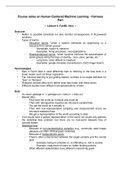Course notes on Human-Centered Machine Learning - Fairness
Part
— Lecture 5: FairML intro —
Dual use
• Refers to possible beneficial but also harmful consequences of AI-powered
solutions
• Types of harms:
⁃ Allocative harms: “when a system withholds an opportunity or a
resource from certain groups”
⁃ Immediate, easier to measure
⁃ Examples: hiring processes, visa applications
⁃ Representational harms: “when systems reinforce the subordination of
some groups along the lines of identity - race, class, gender, etc.’’
⁃ Long term, more difficult to measure
⁃ Examples: google translate (nurse/doctor), CEO image search
Terminologies
• Bias in FairAI field is used differently than to referring to the bias term in a
linear model, such as linear regression
• Fair machine learning is just getting started, so there is no single definition for
“bias” or “fairness”
• Research articles often don’t define what they mean with these terms
• Different studies have different conceptualizations of bias
Data
• As usual: garbage in -> garbage out = bias in -> bias out
• Biased data:
⁃ First have the world as it should and could be
⁃ Then with retrospective injustice we introduce societal bias
⁃ You get the world as it actually is
⁃ Then with non-representative sampling and measurement errors we
introduce statistical bias
⁃ We get a representation of the world according to data
• If we would have a perfect representation of the world, we would only address
the statistical bias problem; but there are no real-world datasets free of
societal biases
• Statistical bias:
⁃ Because of non-representative sampling (e.g., commonly used image
datasets are often US/European centered)
⁃ Because of measurement errors
⁃ There’s often a disconnect between the target variable and the overall
goal
⁃ Example: being re-arrested vs. re-offending vs. risk to society
⁃ Example: repayment of loans vs. better lending policies
⁃ Often different stakeholders have different overarching goals
, Datasheets for Datasets (Gebru et.al 2021)
• Motivation: e.g., for what purpose was the dataset created?
• Composition: e.g., does the dataset contain data that might be considered
sensitive in any way (e.g., data that reveals racial or ethnic origins, sexual
orientations, religious beliefs, etc.)?
• Collection process: e.g., what mechanisms or procedures were used to collect
the data (e.g., hardware apparatus or sensor, manual human curation,
software program, software API)?
• Uses: e.g., are there tasks for which the dataset should not be used?
• Distribution: e.g., how will the dataset be distributed (e.g., tarball on website,
API, GitHub)?
• Maintenance: will the dataset be updated (e.g., to correct labeling errors, add
new instances, delete instances)?
Fairness in development of ML models
• Sample size: usually performance tends to be lower for minority groups; this
even happens when data is fully representative of the world
• ML models can amplify biases in the data
⁃ Example from Zhao et al.: 33% of the cooking images have man in the
agent role, but during test time, only 16% of the agent roles are filled
with man
• Features:
⁃ Instances are represented by features
⁃ Which features are informative for a prediction may differ between
different groups
⁃ A particular feature set may lead to high accuracy for the majority
group, but not for a minority group
⁃ The quality of the features may differ between different groups
⁃ What about the inclusion of sensitive attributes as feature (e.g, gender,
race)? Would it:
⁃ Improve overall accuracy but lower accuracy for specific groups
⁃ Improve overall accuracy, for all groups
⁃ What if we need such information to evaluate the fairness of systems?
• Evaluation:
⁃ In ML, the evaluation often makes strong assumptions
⁃ Outcomes are not affected by decisions on others
⁃ Example: denying someone’s loan can impact the ability of a
family member to repay their loan
⁃ We don’t look at the type and distribution of errors
⁃ Decisions are evaluated simultaneously
⁃ Feedback loops & long-term effects
• Model cards for model reporting (Mitchell et al. 2019)
⁃ Aim: transparent model reporting, such as:
⁃ Model details (e.g., version, type, license, features)
⁃ Intended use (e.g., primary intended uses and users, out-of-
scope use cases)
⁃ Training data
⁃ Evaluation data
⁃ Ethical considerations




